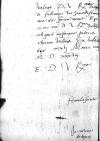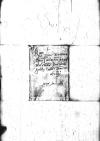Letter #1863
Ioannes Antonius de TAXIS to Ioannes DANTISCUSValladolid, 1538-05-26
| received [1539]-01-19 Manuscript sources:
Prints:
| ||||||||
Text & apparatus & commentaryPlain textText & commentaryText & apparatus
Reverendissimo Domino, domino
Reverendissime Praesul et Domine, domine observandissime.
Humillimam commendationem.
Admirabitur fortassis Dominatio Vestra Reverendissima, quae sit haec mea audacia scribendi, quam imputabit pietati ipsi, quae me impellit, ut commendem Dominationi Vestrae Reverendissimae
Nihil addam amplius, ne molestus sim Dominationi Vestrae Reverendissimae. Ego is sum, cuius precibus dominus
Valeat Dominatio Vestra Reverendissima longum. Dominus
Iterum valeat.
Ex
Eiusdem Dominationis Vestrae Reverendissimae humilis servitor



 BCz, 1596, p. 492
BCz, 1596, p. 492